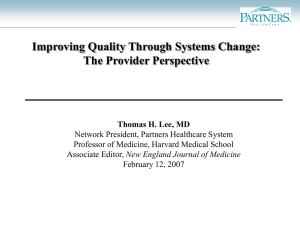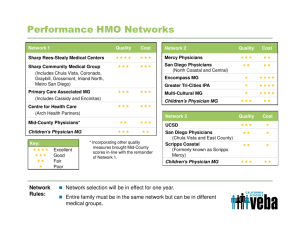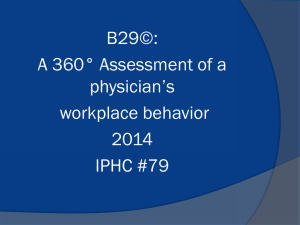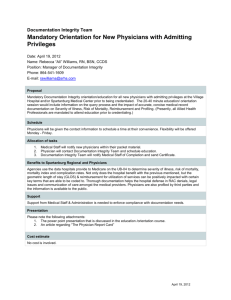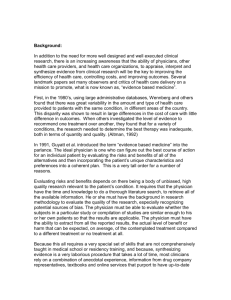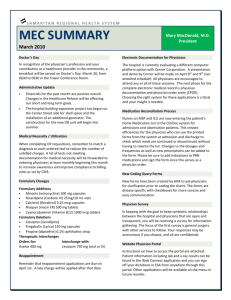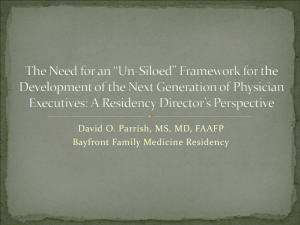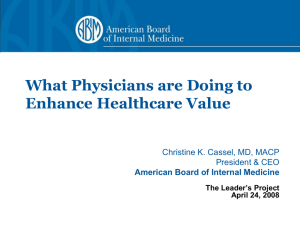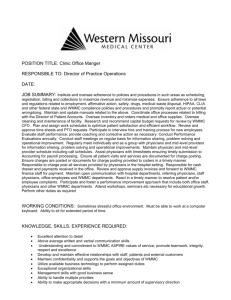Keeping Personal Relationships Intact During Times of Stress
advertisement
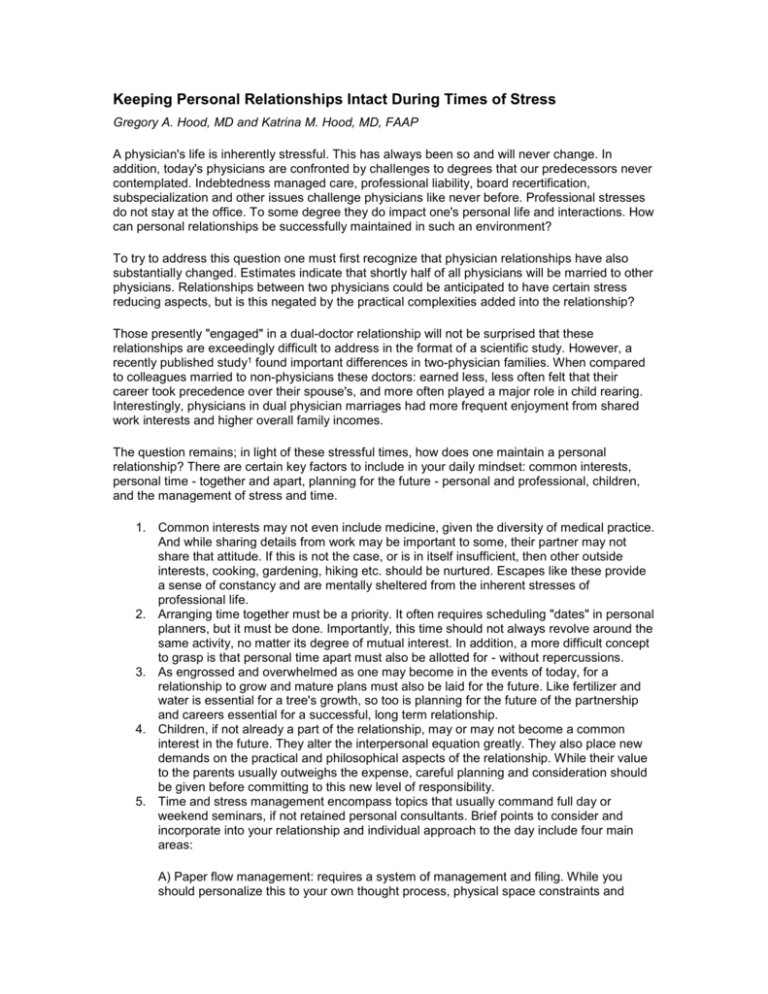
Keeping Personal Relationships Intact During Times of Stress Gregory A. Hood, MD and Katrina M. Hood, MD, FAAP A physician's life is inherently stressful. This has always been so and will never change. In addition, today's physicians are confronted by challenges to degrees that our predecessors never contemplated. Indebtedness managed care, professional liability, board recertification, subspecialization and other issues challenge physicians like never before. Professional stresses do not stay at the office. To some degree they do impact one's personal life and interactions. How can personal relationships be successfully maintained in such an environment? To try to address this question one must first recognize that physician relationships have also substantially changed. Estimates indicate that shortly half of all physicians will be married to other physicians. Relationships between two physicians could be anticipated to have certain stress reducing aspects, but is this negated by the practical complexities added into the relationship? Those presently "engaged" in a dual-doctor relationship will not be surprised that these relationships are exceedingly difficult to address in the format of a scientific study. However, a recently published study1 found important differences in two-physician families. When compared to colleagues married to non-physicians these doctors: earned less, less often felt that their career took precedence over their spouse's, and more often played a major role in child rearing. Interestingly, physicians in dual physician marriages had more frequent enjoyment from shared work interests and higher overall family incomes. The question remains; in light of these stressful times, how does one maintain a personal relationship? There are certain key factors to include in your daily mindset: common interests, personal time - together and apart, planning for the future - personal and professional, children, and the management of stress and time. 1. Common interests may not even include medicine, given the diversity of medical practice. And while sharing details from work may be important to some, their partner may not share that attitude. If this is not the case, or is in itself insufficient, then other outside interests, cooking, gardening, hiking etc. should be nurtured. Escapes like these provide a sense of constancy and are mentally sheltered from the inherent stresses of professional life. 2. Arranging time together must be a priority. It often requires scheduling "dates" in personal planners, but it must be done. Importantly, this time should not always revolve around the same activity, no matter its degree of mutual interest. In addition, a more difficult concept to grasp is that personal time apart must also be allotted for - without repercussions. 3. As engrossed and overwhelmed as one may become in the events of today, for a relationship to grow and mature plans must also be laid for the future. Like fertilizer and water is essential for a tree's growth, so too is planning for the future of the partnership and careers essential for a successful, long term relationship. 4. Children, if not already a part of the relationship, may or may not become a common interest in the future. They alter the interpersonal equation greatly. They also place new demands on the practical and philosophical aspects of the relationship. While their value to the parents usually outweighs the expense, careful planning and consideration should be given before committing to this new level of responsibility. 5. Time and stress management encompass topics that usually command full day or weekend seminars, if not retained personal consultants. Brief points to consider and incorporate into your relationship and individual approach to the day include four main areas: A) Paper flow management: requires a system of management and filing. While you should personalize this to your own thought process, physical space constraints and needs the first, and most overlooked principle of this is to PURGE your office and home. No stacks are allowed. Throw all of them away! This alone should help maintain your personal relationship! B) Delegation: Not relegation is key in the office and at home. One who is effective at appropriately delegating work to others will likely feel less overwhelmed and will also be able to get home earlier. Similarly, agreed upon division of duties in the relationship is essential. No one can do it all. An important additional consideration is to sit down regularly, monthly, quarterly, whatever, and review how the division of tasks and progress on common goals is proceeding. C) Nuisance management: is something that most people handle poorly. Whether at home or at work interruptions and "tolerances" abound. First, "tolerances". A tolerance is something that has become a regular consumer of your time, but that is not a priority for you nor is it a part of the path to achieving your goals. They must be recognized for what they are, and appropriately eliminated. Interruptions are more abrupt and more easily recognized. They too must be controlled or eliminated. While it is easy to understand that the ONLY justified interruptions in the workday are imperative interruptions; the same standard must be employed when an interruption threatens the quality of your personal life. Improving in these areas are often the points where the most time and quality can be reinstated into one's personal relationship. D) Expectation management: for life to flow smoothly at work, your office staff must understand you and your expectations. They cannot know what is and is not a priority if they do not understand you. Your significant other, no matter how wonderful, is not omniscient. They too need to understand you. Again, regular time together and some degree of a routine in how the two of you approach life are necessary to succeed.
